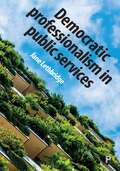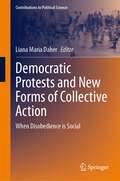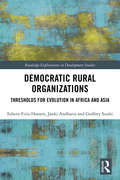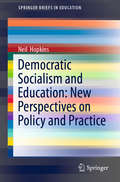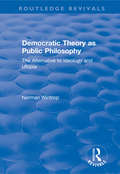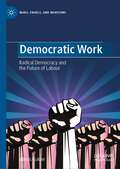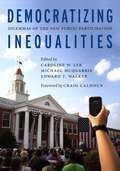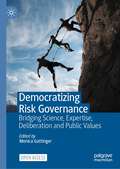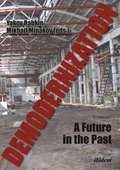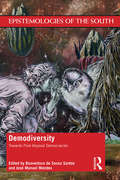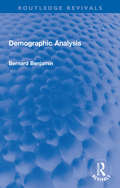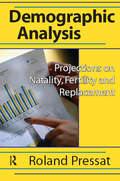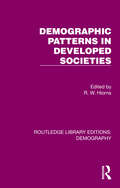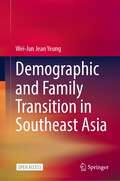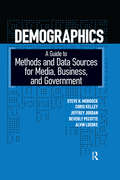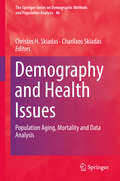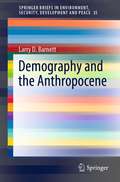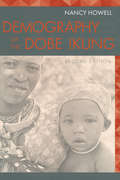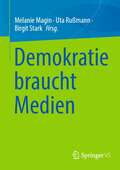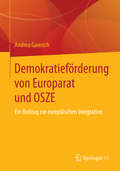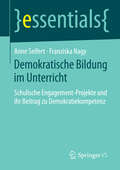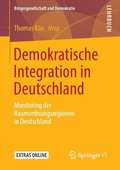- Table View
- List View
Democratic Professionalism in Public Services
by Jane LethbridgeDemocratic professionalism is an approach that enables public service professionals to work more democratically with clients, patients, students and other public service users. This book explores what it means to act in a democratic way and provides practical guidance which will help public service professionals ensure users are at the centre of public services delivery, drawing from examples of different public services around the world. It considers the conflicts and tensions of being an activist and a professional and provides a vision for a future democratic professionalism.
Democratic Protests and New Forms of Collective Action: When Disobedience is Social (Contributions to Political Science)
by Liana Maria DaherFollowing a dialogic and interdisciplinary approach, this book highlights changes in the concept and action of disobedience, presenting a theoretical framework and applied case studies.Disobedience has traditionally been played out through collective actions and protests which configure and propose alternative social scenarios to the status quo. Today, in a changing socio-historical context, disobedience represents a mode of political participation and a form of an active citizenship attempt to correct authoritarian drifts. Furthermore, it often highlights social problems and morally controversial issues. Disobedience is not only a right granted to the individual within democratic systems and/or duty imposed in the interest of society in a pro-social sense, i.e. defense of human rights and a tendency towards equalization, but it also became an alternative process, often symbolic, of construction of reality.The book focuses on a) reconstructing the concept of social disobedience and the field's state of the art from an innovative, contemporary, theoretical, and conceptual perspective and b) analyzing its phenomenology within a specific territorial horizon, with the objective of uncovering social and pro-social aspects related to today’s forms of disobedience. The book therefore will appeal to students, scholars, and researchers of contemporary political theory, political science, democratization studies, social movement studies, criminology, legal theory, and moral philosophy.
Democratic Rural Organizations: Thresholds for Evolution in Africa and Asia (Routledge Explorations in Development Studies)
by Esbern Friis-Hansen Janki Andharia Suubi GodfreyDemocratic rural organizations can play an important role in helping their members, who are frequently poor farmers living in the margins of the economy, to escape their disadvantaged starting point and to gain access to financial services, political influence and profitable markets for their product. Democratic Rural Organizations: Thresholds for Evolution in Africa and Asia traces the evolution of democratic rural organizations from small groups to larger, NGO financed, multi-tier democratic rural organizations in recent years. Rural citizens have historically formed democratic organizations by their own initiative, to enhance economic and social wellbeing, but in recent years rural mobilization processes are frequently initiated and supported by national Civil Society Organizations (CSOs), who are financed and guided by international NGOs, a process which has had mixed results. Using rich empirical material from Uganda, India, Bangladesh and Cambodia, Democratic Rural Organizations: Thresholds for Evolution in Africa and Asia identifies eight thresholds which represent practical stages in the development pathway of democratic rural organizations and influence success or failure. Both development practitioners and researchers of development and rural policy will find this book a useful guide to the deployment of democratic organization as a strategy for economic and political empowerment.
Democratic Socialism and Education: New Perspectives on Policy and Practice (SpringerBriefs in Education)
by Neil HopkinsThis book engages with the political, philosophical and policy debates around contemporary democratic socialism and state education. It examines contemporary education and education systems, as well as democratic socialism in the context of the complex political world we live in currently. It takes the reader towards a democratic socialist curriculum and pedagogy, and concludes by investigating democratic socialism and governance in education. Discussing the work of Axel Honneth, Chantal Mouffe and Norberto Bobbio, the book argues that contemporary democratic socialism gives a philosophical and political grounding to the notion of education being more than simply preparation for work or a series of qualifications. It makes the case for education as an exercise in democratic community, and learning as collective citizenship. Taking the curriculum, classroom pedagogy, and educational governance in turn, it offers a series of practical ways in which state education can be re-interpreted and re-applied to emphasise the democratic, collective and creative aspects of learning. "Hopkins contends, firstly, that twenty-first-century democratic socialism must reinvigorate itself by responding to the challenges of liberalism; and, secondly, that a socially just education system must be willing to learn from such a reinvigorated socialism. These twinned theses are clearly and concisely thought through in relation to urgent educational, and more broadly socio-political, issues: contemporary democratic-socialist thought; educational systems (and possibilities for reform); curriculum design; pedagogy; systems and mechanisms of governance. In just a few thousand words, Hopkins’s Democratic Socialism and Education manages to be that rare thing: a book that is both lucid introduction and original contribution. It will surely appeal equally to teachers, philosophers of education, and those engaged in educational action research." Dr. Oliver Belas, Lecturer in Education, School of Education and English Language, University of Bedfordshire, UK
Democratic Theory as Public Philosophy: The Alternative to Ideology and Utopia (Routledge Revivals Ser.)
by Norman WintropThis title was first published in 2000: This text contends that there are pronounced ideological (apologetic) and utopian biases in how democracy is now viewed by most academic writers, politicians and journalists. Ideological biases result from democracy being seen in formal and procedural ways as parliaments, free elections and competitive parties and pressure groups - irrespective of the standards which guide or the effects produced by these procedures. Utopian democrats reject this narrow empiricism for normative approaches and, instead of realistic norms, they offer impractical, perfectionist and counter-productive standards and goals. As the alternative to ideology and utopia, the author builds upon and draws conclusions from a realistic and normative, public philosophic tradition of writing on democratic politics. This tradition is explained and illustrated by critical responses to Walter Lippman's conception of public philosophy, Lippman's activity as a public philosopher, and the work of major democratic theorists from Alexis de Tocqueville to Giovanni Sartori.
Democratic Work: Radical Democracy and the Future of Labour (Marx, Engels, and Marxisms)
by Alexis CukierThis book proposes a radical transformation of labour institutions, in order to lay the foundation for the democratization of society rather than capitalist accumulation. Using an empirical analysis of the contemporary world of work, Alexis Cukier examines the democratic meaning of today’s critique of work organization and questions the theoretical models (linked to class struggles and to industrial democracy) to conceive of a "democratic work." Considering particular historical experiments (such as cooperatives, self-management, worker’s councils) that try to realize democracy at work, this book also analyzes the political issue of "democratic work" in relation to issues such as labour law, feminist struggles and political ecology. Ultimately, this book proposes some institutional paths that could overtake the divide between the rights of the citizens and the rights of the workers, arguing finally: if we really want to radicalize democracy, we should begin with democratizing work.
Democratization and Welfare State Development in Taiwan (Routledge Revivals)
by Christian AspalterThis title was first published in 2002: Since the bloodless transition from authoritarian state to fully-fledged democracy, Taiwan has undergone a period of dramatic social and political change. In a political culture increasingly dominated by platforms built on social policy issues, this book provides an intriguing case study of the application of welfare state theories to the real-life social development of Taiwan. Combining a state-of-the-art discussion of the major theoretical schools of thought with in-depth analysis of the electoral promises and programmes in recent Taiwanese elections, the book looks at the direct causal relationship between political competition in democratic elections and welfare state construction. It will prove essential reading for all those interested in the area of comparative social policy, welfare theory, Asian studies and politics.
Democratizing Inequalities: Dilemmas of the New Public Participation
by Caroline W. Lee, Michael McQuarrie, and Edward T. WalkerOpportunities to “have your say,” “get involved,” and “join theconversation” are everywhere in public life. From crowdsourcing and town hallmeetings to government experiments with social media, participatory politics increasinglyseem like a revolutionary antidote to the decline of civic engagement and thethinning of the contemporary public sphere. Many argue that, with newtechnologies, flexible organizational cultures, and a supportive policymakingcontext, we now hold the keys to large-scale democratic revitalization.Democratizing Inequalities shows that the equation may not be sosimple. Modern societies face a variety of structural problems that limitpotentials for true democratization, as well as vast inequalities in politicalaction and voice that are not easily resolved by participatory solutions. Popularparticipation may even reinforce elite power in unexpected ways. Resisting anoversimplified account of participation as empowerment, this collection ofessays brings together a diverse range of leading scholars to reveal surprisinginsights into how dilemmas of the new public participation play out in politicsand organizations. Through investigations including fights over theauthenticity of business-sponsored public participation, the surge of the TeaParty, the role of corporations in electoral campaigns, and participatorybudgeting practices in Brazil, DemocratizingInequalities seeks to refresh our understanding of public participation andtrace the reshaping of authority in today’s political environment.
Democratizing Risk Governance: Bridging Science, Expertise, Deliberation and Public Values
by Monica GattingerThis open access book features contributions from a multidisciplinary team of leading and emerging scholars focused on democratization of risk assessment, management, and communication. The volume identifies and sheds light on key risk governance dilemmas related to public trust, risk perception and public participation. The first part of the book articulates the relationship among science, expertise, deliberation and public values, featuring an in-depth analysis of the concept of ‘motivated reasoning,’ and the role of trust, values and worldviews in understanding and addressing contemporary controversies over risk decision-making. The volume’s second part features eight case studies from three policy fields – energy, genomics, and public health – and a special section dedicated to vaccine decision-making for Covid-19. Chapters analyze the level, nature and mechanisms of public involvement in risk decision-making, assessing its contribution to the effectiveness and legitimacy of decisions. The case studies focus predominantly on Canada, but they draw on global scholarship and are of direct relevance for scholars and practitioners of risk governance in any country.
Demodernization: A Future in the Past
by Mikhail Minakov Yakov RabkinMedical doctors driving taxis, architects selling beer on street corners, scientific institutes closed down amid rusting carcasses of industrial plants—these images became common at the turn of the twenty-first century in many once modern “civilized” countries. In quite a few of them, longtime neighbors came to kill each other, apparently motivated by the newly discovered differences of religion, language, or origin. Civil nationalism gave way to tribal, ethnic, and confessional conflict. Rational arguments of a geopolitical nature have been replaced by claims of self-righteousness and moral superiority. These snapshots are not random. They are manifestations of a phenomenon called demodernization that can be observed from the banks of the Neva to the banks of the Euphrates, from the deserts of Central Asia to the English countryside and all the way to the city of Detroit. Demodernization is a growing trend today, but it also has a history. Seventeen scholars, including historians, philosophers, sociologists, and archaeologists, offer their views of demodernization. The book is divided into three parts dedicated to conceptual debates as well as historical and contemporary cases. It book provides a wealth of empirical materials and conceptual insights that provide a multifaceted approach to demodernization.
Demodiversity: Toward Post-Abyssal Democracies (Epistemologies of the South)
by Boaventura de Sousa SantosWe are living in a time when social and political authoritarianism appear to be gaining ground around the world. This book presents the democratic practices, spaces and processes that engage directly with the theoretical assumptions advanced by the epistemologies of the South, summoning other contexts and empirical realities that attest to the possibility of a renewal and deepening of democracy beyond the liberal and representative canon, which is embedded within a world capitalist system. The chapters in this book put forward the ideas of demodiversity, of high-intensity democracy, of the articulation between representative democracy and participatory democracy as well as, in certain contexts, between both these and other forms of democratic deliberation, such as the communitarian democracy of the indigenous and peasant communities of Africa, Latin America and Asia. The challenge undertaken in this book is to demand utopia, imagining a post-abyssal democracy that permits the democratizing, decolonizing, decommodifying and depatriarchalizing of social relations. This post-abyssal democracy obliges us to satisfy the maximum definition of democracy and not the minimum, transforming society into fields of democratization that permeate the structural spaces of contemporary societies.
Demographic Analysis (Routledge Revivals)
by Bernard BenjaminFirst published in 1968, Demographic Analysis was written to provide a comprehensive account of demographic methods for those with a need to understand population movements. The book provides an introduction to some of the key tools used by demographers and the principal sources of population data. Beginning with an overview of the scope, content and use of the population census, it then examines methods for measuring births, deaths, and migration before setting out the methodology for determining the contributions of these elements to population change and estimating past or future changes. The book also explores sickness as a population characteristic and a way of better understanding mortality variations.
Demographic Analysis: Projections on Natality, Fertility and Replacement
by Roland PressatPopulation control requires that the birth rate equal to the death rate. If it is too low population will decline; if it is too high, population will increase. If either condition persists long enough the population will diminish towards zero or increase towards infinity. Fortunately, the birth trajectory does not have to be set once and for all, but can be adjusted within limits. Since birth and death rates determine whether we are heading for population extinction or explosion, they are well designated "vital statistics." Their understanding and use are a central theme of demographic analysis."Demographic Analysis" presents those techniques that are often called for in the study of demographic problems. Such techniques permit researchers to fill the gap between the large amounts of data made available by censuses and the theoretical and practical questions that need to be answered; the techniques of this book effectively bring the data into confrontation with the problems. In his treatment of population projection, Pressat applies methods developed in earlier sections for mortality arid fertility. The emphasis is on population projection and accords with its usefulness in demographic analysis. The meaning of a demographic rate or trend is brought out by seeing to what condition it would lead if continued. No assumption is made that the concrete future will follow either path.The substance of the book is devoted to the main themes of mortality and fertility. Underlying these as well as nearly every other kind of data with which the demographer deals is the problem of location in time - the relation of vital events to the calendar, and also to the age of the persons undergoing them. Pressat's detailed attention to this problem forms a solid basis for how current methodology accounts of demographic changes.
Demographic Patterns in Developed Societies (Routledge Library Editions: Demography #7)
by R. W. HiornsOriginally published in 1980, this volume reviews the demographic patterns of fertility, marriage and mortality with reference to developed societies in the 19th and 20th centuries in Western Europe and North America. New (at the time of publication) data and methodology are considered and discussed, while maintaining the historical perspective.
Demographic and Family Transition in Southeast Asia
by Wei-Jun Jean YeungThis open access book presents the trends and patterns of demographic and family changes from all eleven countries in the region for the past 50 years. The rich data are coupled with historical, cultural and policy background to facilitate an understanding of the changes that families in Southeast Asia have been going through. The book is structured into two parts. Part A includes three segments preceded by a briefing on Southeast Asia. The first segment focuses on marital and partnership status in the region, particularly marriage rates, age at marriage, incidence of singlehood, cohabitation, and divorce. The second segment focuses on fertility indicators such as fertility rates (total, age-specific, adolescent), age at childbearing, and childlessness. The third presents information on household structures in the region by examining household sizes, and incidence of one-person households, single-parent families, as well as extended and composite households. Part B presents indicators of children and youth’s well-being.
Demographics: A Guide to Methods and Data Sources for Media, Business, and Government
by Beverly Pecotte Steven H. Murdock Chris Kelley Jeffrey L. Jordan Alvin LuedkeDemographics has become a critical dimension of the work of many journalists, business professionals, and government analysts and managers. Yet those who are not professional demographers often find locating and effectively using demographics difficult. Written by leading authorities, Demographics provides a single-volume resource that is readily understandable by everyone. It describes and demonstrates how students and working professionals can obtain, use, and communicate demographic information effectively. Consisting of ten chapters organized into four sections on basic demographic concepts, definitions, and methods, this book includes sources of demographic and economic data as well as explanations and examples of how to effectively and accurately use them.
Demography and Health Issues: Population Aging, Mortality And Data Analysis (The\springer Series On Demographic Methods And Population Analysis Ser. #46)
by Christos H. Skiadas Charilaos SkiadasThis book provides new theories, applications and quantitative methods in demography, population studies and statistics. It presents and applies data analysis, statistics and stochastic modeling techniques focusing on demography, population aging, mortality and health sciences. The book describes diverse stochastic processes as well as Markov and semi-Markov models in demography and population studies, along with chapters on statistical models and methods in biostatistics and epidemiology. As such the book will be a valuable source to demographers, health scientists, statisticians, economists and sociologists.
Demography and the Anthropocene (SpringerBriefs in Environment, Security, Development and Peace #35)
by Larry D. BarnettEnvironmentalists devote little attention at the moment to the size and growth of the human population. To counter this neglect, the monograph (i) includes original graphs showing population size and growth since 1920 in the world as a whole and the United States; (ii) assembles evidence tying the increasing number of people to ecosystem deterioration and its societal consequences; and (iii) analyzes sample-survey data to ascertain whether the current disregard of population pressures by U.S. environmentalists reflects the thinking of Americans generally. However, even if a nation took steps primarily intended to lower childbearing and immigration, the findings of social science research indicate that the steps would not have a substantial, lasting impact. The discussion, which suggests an indirect way by which government may reduce fertility, underlines for environmental scholars the importance of studying their subject in a multidisciplinary, collaborative setting.
Demography of the Dobe !Kung
by Robert GutmanFirst published in 1979, this is a classic study of the population of the Bushmen of the Kalahari Deselt of Botswana. Using methods that are simple and fully illustrated, the author presents empirical descriptions of the fertility, mortality, and marriage patterns of the now famous !Kung hunter-gatherers.The !King "Bushman" people of the Kalahari desert in Africa occupy an anomalous position in the world of science. They have been selected for intensive study precisely because they are geographically, socially, and economically removed from modern, industrialized society, living in a sparsely settled and remote portion of an enormous semidesert. The !Kung maintain the language and culture of a fully develop hunting and gathering society with (until very recently) no dependence on cultivated plants, no domesticated animals other than the dog, no stratification system based on kinship or occupation, no power or authority structure extending further than the local bands composed of a few related families, no wage labor, no use of money, and no settled sites of occupation.At the same time, the !Kung have become well-known figures to students—both undergraduate and professional—of Western social science. The faces of !Kung informants gaze from the covers and the illustrations of many texts in anthropology and sociology.Why has all this attention been developed around the !Kung people? Part of the answer lies in the people themselves. The !Kung are a physically attractive people, with slender, graceful bodies and open small-featured faces that are appealing and photogenic. Their culture is simple and has its striking features. The struggle for subsistence, the click language, the emphasis on sharing and humility, the drama of the curing dances in which individuals go into trance and speak directly to spirits to cure sickness, and the pervasive humor, teasing, and playfulness of the !Kung style are all features that are relatively easy to convey and interesting to l earn about.This work covers areas such as marriage, fertility, disease, mortality, history, and the projected future of the !Kung. This book will be of interest to students of demographic studies, anthropology, and African studies.
Demokratie braucht Medien
by Uta Rußmann Melanie Magin Birgit StarkFreie und unabhängige Medien sind die Grundlage einer lebendigen Demokratie. In normativen Demokratiemodellen wird die „Wächterrolle“ von Medien betont, weil neben der Kontroll- und Informationsfunktion der Medien ihr Beitrag zur Legitimierung politischer Prozesse als zentral angesehen wird. Medien unterliegen jedoch im digitalen Wandel einem hohen Anpassungsdruck: Sie drohen ihre traditionelle Gatekeeper-Rolle zu verlieren und konkurrieren mit globalen Tech-Giganten wie Facebook und Google um Werbegelder und die Aufmerksamkeit des Publikums. Die Plattformisierung der Medien stellt nicht nur die Vermittlungsleistungen professioneller journalistischer Informationsanbieter in Frage, sondern auch die Rolle der Medien in der Herstellung von Öffentlichkeit. Der Band hinterfragt die sich wandelnde Rolle der Medien im politischen System sowie das Verhältnis von Medien und Politik kritisch. Funktionen und Autonomiegrad von Medien und Journalismus werden analysiert. Mithilfe von Zeitvergleichen werden tiefgreifende Veränderungen wie auch Konstanten herausgearbeitet. Nicht zuletzt gilt es zu erörtern, welche Akteure welche Verantwortung tragen und welche Privilegien sie genießen (sollten).
Demokratie im Alltag: Zum Bürger*innenbewusstsein Wiener Jugendlicher (Citizenship. Studien zur Politischen Bildung)
by Dirk Lange Tobias DoppelbauerDas Buch entwickelt die empirische Basis der politischen Bildung aus der Perspektive einer kritisch-konstruktivistischen und qualitativen Politikdidaktik. Neben Rekonstruktionen von Demokratievorstellungen werden vielfältige Zugänge zu Demokratie aufgezeigt und didaktische Implikationen für die Praxis politischer Bildung exploriert. Untersucht werden die Demokratievorstellungen Wiener Jugendlicher im Kontext der postdemokratischen Konstellation ‚westlicher‘ und liberaler Demokratien.
Demokratie und Soziale Arbeit: Sensibilisierung für die Wahrnehmung und Veränderung von Ungleichheiten in unserer Gesellschaft
by Monika Alamdar-Niemann Bärbel Schomers Marion TackeDer Tagungsband „Demokratie und Soziale Arbeit“ befasst sich aus unterschiedlichen Perspektiven mit zentralen aktuellen Fragen der Sozialen Arbeit. Wie kann Teilhabe und Partizipation in der Gesellschaft ungeachtet der sozialen Lage der Adressat*innen, ihres Geschlechts, ihrer sexuellen Orientierung, ihrer ethnischen Herkunft und Hautfarbe, ihrer Religion und Sprache, ihres Alters und rechtlichen Status ermöglicht werden? Soziale Arbeit mit Blick auf die zugrundeliegenden strukturellen Mechanismen von Ausgrenzung und Abwertung zielt auf eine Humanisierung der deutschen Gesellschaft. Es geht um nicht weniger als die Professionalisierung einer Arbeit gegen Diskriminierung zur Wahrung demokratischer Prinzipien, denen sich die hier versammelten Autor*innen widmen.
Demokratieförderung von Europarat und OSZE
by Andrea GawrichEuroparat und OSZE werden in der öffentlichen und wissenschaftlichen Debatte selten als Akteure der europäischen Integration wahrgenommen. Dabei stellen sie eine bedeutende Brücke zwischen dem EU-Europa und dem erweiterten Europa sowie den Regionen der europäischen Nachbarschaft dar. Zwar gilt das Demokratisierungspotential von Europarat und OSZE im Vergleich zur EU-Beitrittskonditionalität als gering, gleichzeitig mangelt es bislang jedoch an Analysen zu den Demokratisierungsbemühungen von Europarat und OSZE. Dieses Buch unternimmt vor diesem Hintergrund eine umfassende Analyse der Demokratieförderung des Europarats in seinen 47 Mitgliedsstaaten und der OSZE in ihren 57 teilnehmenden Staaten zwischen 1990 und 2012.
Demokratische Bildung im Unterricht: Schulische Engagement-Projekte und ihr Beitrag zu Demokratiekompetenz (essentials)
by Anne Seifert Franziska NagyWer gestaltet unsere Demokratie? Wie werden Jugendliche zu Gestaltern ihrer eigenen Gegenwart und Zukunft in einer demokratischen Gesellschaft? Und welche Rolle können Erfahrungen in der Schule dabei spielen? Mit diesen Fragen beschäftigt sich dieser Beitrag. Am Beispiel der Lehr- und Lernform Service-Learning untersuchen die Autorinnen, ob und wie sich Demokratiekompetenz bereits in jungen Jahren erlernen lässt.
Demokratische Integration in Deutschland: Monitoring der Raumordnungsregionen in Deutschland (Bürgergesellschaft und Demokratie)
by Thomas KlieDieser Band legt – basierend auf der Wahlbeteiligung, dem Engagement der Bürgerinnen und Bürger sowie dem Systemvertrauen – ein Modell für ein regionales Maß für das vor, was die Autoren und Autorin "Demokratische Integration" nennen. Das eingeführte Strukturgleichungsmodell zeigt mit hoher empirischer Evidenz relevante Einflussgrößen auf das unterschiedliche Maß an demokratischer Integration in den europäischen Staaten sowie in den Regionen Deutschlands. Es konnte gezeigt werden: Nicht Personenmerkmale, sondern Merkmale von Regionen erklären das Ausmaß, aber auch die Gefährdung demokratischer Integration und damit der demokratischen Resilienz. Die Ergebnisse dieses Bandes bilden die Grundlage für ein dauerhaftes regionalisiertes Demokratie-Monitoring in Deutschland. Der Inhalt · Einführung: Sozialstruktur und demokratische Integration · Demokratische Integration in Europa: Deutschland im europäischen Vergleich · Demokratische Integration in den Raumordnungsregionen von Deutschland · Zusammenfassung und Ausblick Die Zielgruppen · Studierende und Lehrende der Politik- und Sozialwissenschaften · Politische Akteur*innen Der Autor Prof. Dr. habil. Thomas Klie ist Professor für öffentliches Recht und Verwaltungswissenschaft an der Evangelischen Hochschule Freiburg i. Br., Privatdozent an der Universität Klagenfurt/IFF-Wien und Leiter des Zentrums für zivilgesellschaftliche Entwicklung (zze) Freiburg/Berlin.
